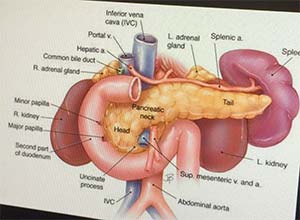The Fight Against Pancreatic Cancer
Jun 4, 2019Surgical oncologist discusses symptoms, diagnosis, treatment and prevention
November is Pancreatic Cancer Awareness Month. Pancreatic cancer is the number four killer among all cancers in men and women. Only about 7 percent of people diagnosed with pancreatic cancer will survive for more than five years. Less than 2 percent survive 10 years. These low survival rates are attributed to the fact that most pancreatic cancer is diagnosed at an advanced stage. Because symptoms of pancreatic cancer can be vague and develop over time, patients may not recognize that something is wrong.
 “The biggest difficulty with pancreatic cancer is that usually by the time we identify the cases, the patient’s cancer may have spread,” said Baptist Cancer Center Surgical Oncologist Dennis Rousseau, M.D. “However, we are very hopeful that in the near future there will be methods of screening for pancreatic cancer and better treatment options. As we study the disease, we are gaining a better understanding the genetics of it, and with the rapid development of agents that target certain mutations or genetic alterations, we will have more medications that we can use to target pancreatic cancer in a more specific way for a much better outcome.”
“The biggest difficulty with pancreatic cancer is that usually by the time we identify the cases, the patient’s cancer may have spread,” said Baptist Cancer Center Surgical Oncologist Dennis Rousseau, M.D. “However, we are very hopeful that in the near future there will be methods of screening for pancreatic cancer and better treatment options. As we study the disease, we are gaining a better understanding the genetics of it, and with the rapid development of agents that target certain mutations or genetic alterations, we will have more medications that we can use to target pancreatic cancer in a more specific way for a much better outcome.”
The most common symptoms can include pain, usually in the abdomen or back, weight loss, jaundice (yellowing of the skin and/or eyes), loss of appetite, nausea, change in stool, pancreatitis and/or recently acquired diabetes.
Those who are considered at high risk for pancreatic cancer include people who have two or more first-degree relatives (parent, sibling or child) who have had pancreatic cancer, a first-degree relative who developed pancreatic cancer before the age of 50, or an inherited genetic syndrome associated with pancreatic cancer. Pancreatic cancer is diagnosed through the use of computed tomography (CT) scans, magnetic resonance imaging (MRI), endoscopic ultrasound and biopsy. When diagnosed early, surgical removal offers the best chance for long-term control of pancreatic cancer.
There are no absolute risk factors for pancreatic cancer, however there are associations with cigarette smoking, alcohol abuse and chronic pancreatitis. Prevention tips are like those for other cancers. Get moderate and vigorous exercise weekly, don’t smoke, and eat a diet that limits red meat and is high in fruits and vegetables.
“The most important thing when dealing with a diagnosis of pancreatic cancer for the best possible outcome is to be treated at a center that specializes in the multidisciplinary care of pancreatic cancer,” said Dr. Rousseau. “These centers include specialized surgeons, medical oncologists, radiation oncologists, gastroenterologists and interventional radiologists who come together to create an individualized treatment plan for each patient.”
Find more information on Baptist Cancer Center services at https://www.baptisthealthsystem.com/our-services/cancer-care.


